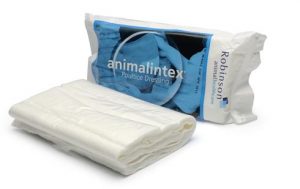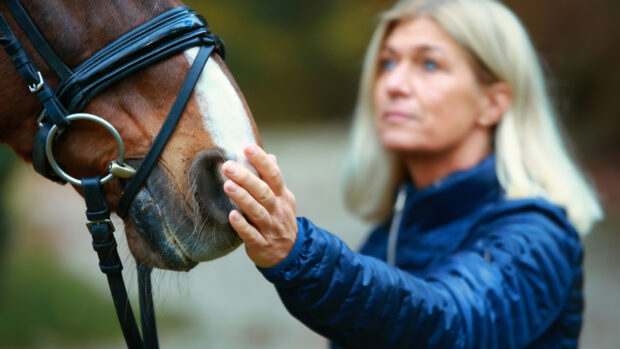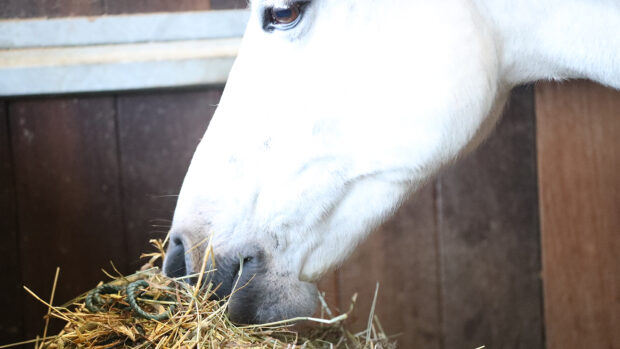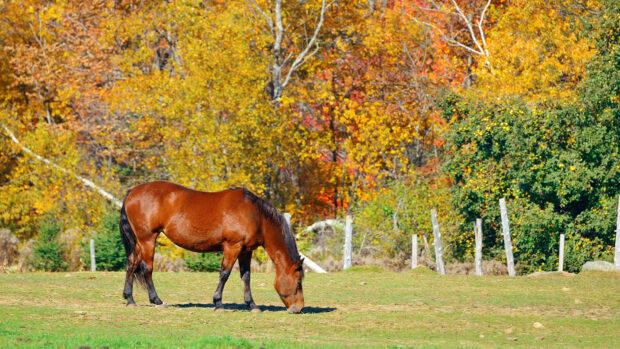Prompt first aid treatment can have an important influence on the eventual outcome of an injury. What you do, and how quickly, can have a dramatic impact on healing time and recovery.
In order for treatment to be effective it is vital that you have access to a well stocked first aid kit whilst at home on the yard and when away at competitions. However with so many products available on the market it can often be confusing when deciding what to keep in your equine first aid kit.
Here leading first aid and wound care experts Robinson Animal Healthcare explain the importance of some of the basic emergency essentials…
Wound Dressings
Wound dressings are essential for numerous reasons. The correct dressing for a particular wound should maintain a moist environment at the wound interface and absorb excess exudates which will encourage the wound to heal more rapidly and reduce the risk of infection and scarring. Dressings provide a physical barrier to help keep micro-organisms out and maintain thermal insulation, but they must still allow gaseous exchange.
Non-adherent dressings should be used on open or infected wounds accompanied by high levels of exudates where as low to medium exudating wounds can be dressed with low adherent dressings. It is important that once a dressing is removed it can be done so easily without causing trauma and that it does not leave any foreign particles behind.
All dressings must be non-toxic, non-allergenic and suitable for the wound type as no single dressing is appropriate for all wound types and all stages of healing.
For open and infected wounds Activate®, from Robinson Animal Healthcare, is suitable to use. The activated carbon dressing is ideal for cleansing and healing open and infected wounds. The multi-layered dressing incorporates activated carbon which has been found to attract and absorb bacteria into the dressing keeping contamination away from the wound surface. The dressing promotes rapid wound closure and improves normal healing process of wounds susceptible to exuberant granulation (proud flesh). Excellent results have been observed when Activate has been used on chronic wounds that were previously not responding to treatment. The dressings are sterile, non-adherent and absorb exudates, eliminating odours.
For low to medium exudating wounds Skintact®, from Robinson Animal Healthcare, is ideal as it is a low adherent sterile perforated film dressing. The protective dressing is also double sided for ease of use and is available in a range of sizes.
Poultices
Unfortunately wounds sometimes become infected. If your horse has a large wound which is infected you should call a vet immediately, particularly if your horse is showing signs of distress.
However, a wide range of conditions – including wounds – can be treated by poulticing. There are a number of poultices available but very few have a Veterinary Medicine Licence. This licence is very important as the formulation needs to be strictly controlled as poultices have a pharmaceutical effect on the horse.
Products having such an effect but not having a licence are illegal, not to mention potentially dangerous for your horse. The control is rather like the control of drugs for people.
Animalintex®, from Robinson Animal Healthcare, is a very well known and trusted product which is licensed and has a reputation for being highly effective. It can be used to treat a wide variety of ailments varying from infected wounds, abscesses and embedded thorns to bruises, strains and sprains. The instructions supplied with the product should be followed carefully as these too are regulated by licence.
Animalintex® can be applied as a hot wet poultice, a cold wet poultice or even as a dry wound dressing – particularly in a first aid situation. The technique used depends on the particular condition to be treated. Hot wet poulticing is used for abscesses, corns, cracked heels, infected wounds, laminitis, mud fever, punctured foot, seedy toe, thorns and thrush. Cold wet poulticing is used for bruising, capped elbow, capped hock, sore shins, sprains, strains and splints.
To prepare a hot wet poultice, boil water and allow it to cool to 38 degrees centigrade (so that it does not burn the horse) immerse the poultice and squeeze out excess water. Note that if infected pus is present, the poultice needs to be damp (not wet) so that the pus is absorbed into the poultice.
If a cold wet poultice is to be used, follow the same procedure as above but simply allow the boiled water to cool before application.
The poultice is applied to the horse after cleansing and drying the affected area and then secured with a bandage or poultice boot. The poultice should be changed at least every 12 hours. The progress of the ailment can be checked at the same time. If the horse does not respond to treatment or is showing signs of distress, call your vet.
Cold Therapy
Cold therapy is commonly used in the treatment of inflammation and soft tissue injuries. A popular choice of treatment, cold therapy is a natural, drug-free way to help treat injuries and reduce pain.
It lowers the temperature at the site of injury through heat exchange and constricts local blood vessels. This reduces cell damage and fluid build-up.
Cold therapy is ideally used immediately after an injury occurs and then subsequently for the next 48 hours at regular intervals. Due to the frequent nature of its use, cold therapy involving water may lead to cracked heels or other skin problems. Dry application minimises the risk of such dermatological issues.
For immediate dry cold therapy, Koolpak®, from Robinson Animal Healthcare, is ideal for emergency and routine use as it requires no refrigeration. Suitable for providing fast, effective treatment for tendon injuries, inflammation, knocks, strains, bruises and swellings.
Koolpak® is also ideal for use after competing, particularly on hard ground. It provides instant relief to the leg area and is suitable for all horses.
Easy to use, you simply squeeze the inner sachet in the pack to release freezing liquid. It can be applied directly to the skin and if necessary held in place with a bandage. The Koolpak® will remain effective for up to one hour.
Wound Gel
Research has revealed that moist wound healing provides a more controlled wound environment and encourages healing to start from within, which reduces the risk of scarring. Therefore a suitable wound gel is an invaluable additional to any first aid kit.
Vetalintex® Wound Hydrogel, from Robinson Animal Healthcare, is a specially formulated clear gel which helps cleanse, cushion and protect surface wounds and aid rapid tissue repair. It also helps produce a warm, moist environment, ideal for the re-growth of healthy tissue.
This innovative gel is easy to apply and avoids unnecessary dressing changes making it extremely cost effective. Vetalintex® comes in 15g tubes and should be applied liberally before applying an appropriate secondary dressing such as Activate® or Skintact®.
Bandages
Bandages are used for several reasons. You can apply a bandage to help support and provide protection for tendons and ligaments during exercise and also to reduce swelling, secure dressings and assist in the healing process of injuries.
There are various bandage types available for different purposes:
Equiwrap® – Self-adhering bandages ideal for holding dressings and providing support during strenuous exercise. Equiwrap® can be used over several layers of padding in order to stem bleeding. Flexible, lightweight and cohesive it shapes to the awkward contours of the legs providing support and protection. Once positioned the Equiwrap® will not loosen but should be changed daily and applied over a dressing or gamgee.
Flexoplast® – a strong elastic adhesive bandage used for immobilisation and for holding dressings in place as well as for compression bandaging. It repels water and dirt providing extra security.
Stayform® Conforming Bandage – holds dressings securely and allows movement without slippage. This bandage is ultra-soft and conforms perfectly.
Antibacterial Wash
A good quality antibacterial cleansing wash is useful for skin problems such as mud fever and rain scald.
Activ Wash®, from Robinson Animal Healthcare, is a mild, antibacterial cleanser which gently removes scabs and debris caused by mud fever or rain scald. Available in a 500 ml bottle, it can be easily applied with a damp sponge.
Gamgee
Gamgee is absorbent high quality cotton wool enclosed in a non-woven or gauze cover used to promote wound healing by insulating, cushioning and protecting wounds from external trauma.
Non-woven Veterinary Gamgee® is ideal for providing a low-adherent wound interface and can be used for protection, insulation and absorbency. It can be used as a primary wound dressing or applied over Animalintex® or Skintact® prior to bandaging. It can also be cut and used to gently swab around a wound using a saline solution.
Scissors
A decent pair of blunt ended scissors are essential for cutting bandages and dressings to the required size and also for safe and easy removal of bandages.
For more information on the Robinson Animal Health Care range contact them on 01909 735000 or visit www.robinsonhealthcare.com
Visit the Robinson Animal Health Care Facebook page www.facebook.com





